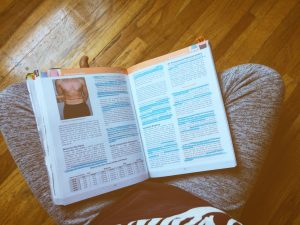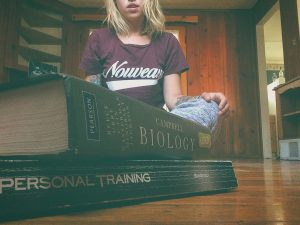This month I officially became an NFPT Certified Personal Trainer. Even though I had my fair share of forehead slapping moments while preparing (I will share those in a moment), I really enjoyed the process. All of my study materials were available online or in digital form. It made it easier to stay organized, and I had all my study guides and practice tests easily accessible. Whenever I needed to study what’s on the test I just grabbed my computer and I was ready to go.
I was already a certified and practicing trainer, but learned some valuable lessons and expanded my horizons by obtaining this certification. This experience has shown me the importance of re-visiting material I have already learned. I feel more confident in my knowledge and ability as a trainer. I am excited to continue my work as an NFPT Certified Personal Trainer.
Knowledge may be well understood in practical application but isn’t as easily retrievable when translated technically on paper. Throughout this experience, I learned something that I believe is vital to all new trainers. The exhausted cliché “Never stop learning” is exhausted for a reason.
The best way to maintain and expand your hard earned knowledge is to continue to work your brain, and learning new things is an excellent way to do this. However, an equally necessary practice is to re-visit or re-learn knowledge on a regular basis. This was revealed to me while I was on the, unexpectedly, challenging process of certifying with NFPT. I assumed that I had it in the bag to begin with. But I soon realized that I too had to study.
Not all Tests are Made the Same
All NCCA accredited CPT tests cover the same subjects of human anatomy, physiology, training program, ethics and communication skills, and fitness components. Yet with the same subjects present in all of these tests, there is still a large variance and certain subjects or more prominently emphasized in different tests. l experienced this concept during my first week of studying. I arrogantly assumed it would be breeze to take the NFPT test because I had done one like it before. I’m also a practicing trainer now, so I didn’t expect a significant challenge.
And it Begins…

They say life is primarily comprised of humbling experiences. This could not be truer about working on this certification. It has been a few years since I’ve needed to actually “study”, and I had flat out forgotten how time consuming it is. The NFPT CPT study manual is 19 chapters; 343 pages. I’m a fast reader, so I thought I could make it through each chapter in 30 minutes max.
Did I mention I was a smidge arrogant going into this whole thing?
Long story short, some of the chapters took me upwards of two hours to get through. I had forgotten that with educational text I have to read slower to truly comprehend the information. Not quite as slowly as the first time I learned the endocrine system’s role in fitness, or the mechanisms of the protein filaments actin and myosin during a muscular contraction. But still, it was slow. I had to take a lot of notes, and re-read certain passages.
It’s all in the Science Baby

The more technical, science based information was the most difficult to re-familiarize myself with. Generally, the information I had learned about metabolic pathways, hormonal responses concerning fitness or the structure of a muscle fiber haven’t been applied as often during my past two years as a trainer.
I am always using anatomy, anatomical language, program designing, and ethics and marketing skills. Right now these subjects are regularly utilized, especially considering I mostly work with special populations and the general fitness client. To have the opportunity to re-visit certain subjects was a much needed review. NFPT’s study manual has a lot of great information concerning training more athletically inclined clients and true athletes. Information that I have already learned, but haven’t had much opportunity to apply in my actual work.
Even though I have already “learned” these subjects while gaining my Associates of Exercise Science and my trainer’s certification with NCSF; I now have a much more concrete understanding of all that knowledge. And this is what I cannot advise enough: never stop re-learning. Return to subjects that you’ve already been taught or have learned on your own. You will never find it possible to understand anything too well. There is a notable distinction between learning something and then truly understanding it. Observing this method is especially important for trainers in their first few years of practicing. Being proactive in your education is an important step in being successful. Because we all want to be that fantastic trainer who never seems to run out of creative ideas. Having a well understood knowledge base is how to get there.
There is a notable distinction between learning something and then truly understanding it. Observing this method is especially important for trainers in their first few years of practicing. Being proactive in your education is an important step in being successful. Because we all want to be that fantastic trainer who never seems to run out of creative ideas. Having a well understood knowledge base is how to get there.
A Simple Task for You
I want to leave you with this simple action that will keep you learning and re-learning.
Make a scheduled time each week that you spend an hour or two reading books or articles relating to personal training.
That’s it. Simple, right? The trick is to mentally make this scheduled time as important and necessary as a doctor’s appointment or work. Find a few hours and dedicate it to your own personal curiosity and research. It’s just once a week, make yourself do it. You’ll be glad you did once it becomes an easily sustainable and enjoyable habit.
Here is some more information about continuing your education and more info for taking the NFPT Exam if you’re in the market!
[info type=”facebook”]If you’re an NFPT trainer, join the Facebook Community Group to share and if you’re not, come chat with NFPT here![/info].
Alex has her A.S in Exercise Science and is a certified Personal Trainer with NFPT and NSCF. She recently traveled to India to gain her 200 hr yoga teacher certification where she studied the ancient practice at its origins. Alex has spent time teaching yoga in Spain while volunteering at a yoga retreat and is currently working at her local college instructing two fitness courses. Alex wants to share with her clients and students the mental, physical and emotionally healing qualities of exercise and movement. She believes everyone should have a healthy relationship with their bodies and strives to thread that concept throughout her career.

